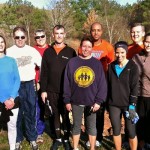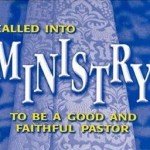Rocks and Roots and Leaves
When you run on the roads or on the sidewalk, you pretty much know what to expect. Besides the occasional pothole or crack, the surface is fairly smooth. You can spend much of your time looking ahead, way down the path that you plan to run.
When you run on trails, things are completely different. Every step is susceptible to rocks and roots and leaves. Sometimes, you see these rocks and roots sticking up out of the dirt or peeking above the leaves. But, sometimes, they are hidden.
So, you have to watch every step carefully… extremely carefully… because any little rock or root can send you sprawling through the woods at full speed. (Remember, we’re running, not taking a stroll.) At the same time, you have to keep an eye (or, at least the occasional glance) at the trail to make sure that you don’t miss a turn.
But, rocks and roots are obvious, right? I mean, everyone expects rocks and roots to be dangerous. But leaves? Why are leaves dangerous while trail running?
In fact, leaves make the path more comfortable to run on. They cushion each step. It feels great to step on a patch of leaves after running over packed dirt, rocks, and roots. So, why would I say that leaves are dangerous?
The obvious answer would be that leaves make the path slippery, and that’s true. But, that’s not the main problem. The main problem is that while leaves make the path more comfortable, leaves also hide rocks and roots, as well as stick and other hazards.
A path that looks like a comfy and cushy pillow of leaves on the surface, could actually be strewn with sharp rocks, obtrusive roots, small stumps, and any number of other hazards. That which seems to make the path easier to run (leaves) actually ends up making the path more difficult.
Let me say that one more time: That which seems to make the path easier to run actually ends up making the path more difficult.
But, isn’t this just like life? I mean, we expect certain things in life (the rocks and roots) to be difficult, tricky, and dangerous. We know that there are financial, mental, emotional, vocational, spiritual, relational, and other types of risks that pop up throughout our lives. Most of the time, we see them coming, even if they are sudden.
However, the real dangers in life are those things that appear to make life more comfortable, easier, and even more enjoyable. When our steps seem to be falling with ease, we are in the most danger of tripping. When our decisions are leading to success after success, we are closest to failing. We our relationships are strongest, we are most likely to be hurt.
What’s the spiritual lesson here? Be watchful. Be diligent. Pay attention.
Even when – especially when – things seem to be going smooth.
—————————————
Spiritual Lessons from Trail Running
- Introduction: Spiritual Lessons from Trail Running
- Rocks and Roots and Leaves
- Leading from the front; leading from behind
- It’s a long, hard road, but we’re running it together
- Meeting other people on the journey
- The Destination, the Journey, and Everything In Between
- Look at your feet; look at the path; look further ahead
We keep singing… as the hungry roam the streets
Joel at “The Double Edged Sword” wrote a post called “Leave the Walls Behind.” Like I told him in a comment, I still have decided if I’m glad that he wrote this post at all.
Most of the post (all except for two short sentences at the top) is the lyrics to a song by Leeland called “While We Sing.” (I don’t keep up with the music industry that much, so I don’t know if Leeland or the song “While We Sin” is or was popular.
Regardless of the popularity, I thought the lyrics were worth contemplating.
Here’s a video of the song (with lyrics):
By the way, before you point out that God desires for us to praise him – even with our singing – I want to remind you of this passage from Isaiah:
Hear the word of the Lord, you rulers of Sodom! Give ear to the teaching of our God, you people of Gomorrah! “What to me is the multitude of your sacrifices? says the Lord; I have had enough of burnt offerings of rams and the fat of well-fed beasts; I do not delight in the blood of bulls, or of lambs, or of goats. When you come to appear before me, who has required of you this trampling of my courts? Bring no more vain offerings; incense is an abomination to me. New moon and Sabbath and the calling of convocations – I cannot endure iniquity and solemn assembly. Your new moons and your appointed feasts my soul hates; they have become a burden to me; I am weary of bearing them. When you spread out your hands, I will hide my eyes from you; even though you make many prayers, I will not listen; your hands are full of blood. Wash yourselves; make yourselves clean; remove the evil of your deeds from before my eyes; cease to do evil, learn to do good; seek justice, correct oppression; bring justice to the fatherless, plead the widow’s cause. (Isaiah 1:10-17 ESV)
It’s clear that God desired for the children of Israel to bring sacrifices to him, but he didn’t want them in this passage. It’s clear that God wanted his children to pray to him – but not in this passage. God had told people how to honor the Sabbath and to hold special feasts, but in this passage he said he had grown weary of them.
What was missing? Why had God grown tired of these displays of affection and worship that he hod told people to bring to him? Perhaps the reason similar to the lyrics of the Leeland song “While We Sing” above…
What if God is tired of hearing all of our songs of praise for the same reason?
Spiritual Lessons from Trail Running
(Note: You may not care anything about exercising, or running, or trail running. But, please read through this post and series. I’ve learned some lessons while trail running that I think are very pertinent to our lives as followers of Jesus Christ and to our lives together as his church.)
For the past two Saturdays – December 3, 2011 and December 10, 2011 – I’ve gone trail running with some friends. A few months ago, when I first start running with the local running club, I heard about trail running. I’ve always enjoyed the woods and trails and hiking, so I thought I would probably enjoy trail running as well.
A group from the local running club goes trail running almost every week. I’ve tried to join them before, but there was always a conflict. Finally, a couple of Saturdays ago (December 3), I was able to join nine other runners for a seven mile trail run near Falls Lake in Raleigh, NC.
Last Saturday, I joined a different group, including my son, to run 3 miles on a different part of the same trail near Falls Lake. (As a side note, this trail is part of the 1000 mile long Mountains-to-Sea trail that runs from through the state of NC from the Great Smokey Mountains to the Atlantic Ocean. My daughter, Miranda, recently entered a photo contest sponsored by the Friends of the Mountains-to-Sea trail, and last week they notified her that she had won first place in the Youth Division!)
When I ran the first few steps on the trail and throughout that day of running, then again throughout the day of trail running the next week, I learned that trail running is quite different from road running. I thought about some of these differences while I was running, and I realized that there are spiritual lessons to be learned from trail running. (Obviously, some of these spiritual lessons can be learned in other ways as well. For example, a few years ago I joined some friends on a 3 day hike through part of the Appalachian trail, and I learned some very similar lessons.)
Some of the lessons were obvious, and you may can even guess now about some of the topics that I’m going to write about. But, some of these lessons are not obvious at all. In fact, looking back, some of these lessons are the opposite of what you might expect.
Over the next few days, I’m going to share some of these lessons in a blog series. While you may not care anything about running or trail running, I hope you will find these lessons challenging and helpful, especially to those of us who are following Jesus Christ.
(One final note: I made a video report before, during, and after my first experience of trail running on Saturday, December 3, 2011.)
—————————————
Spiritual Lessons from Trail Running
- Introduction: Spiritual Lessons from Trail Running
- Rocks and Roots and Leaves
- Leading from the front; leading from behind
- It’s a long, hard road, but we’re running it together
- Meeting other people on the journey
- The Destination, the Journey, and Everything In Between
- Look at your feet; look at the path; look further ahead
Replay: Examples and Models of Ministers
Four years ago, I wrote a post called “Examples and Models.” I’ve added the phrase “of Ministers” to the title here, because that was the original point of the article. What does the term “Minister” mean to you? If you see a special type of Christian, then this article may be for you. You see, that’s what I thought a few years ago when I knew that God was leading me toward something… more? But what? “Well,” everyone told me, “you have two choices: pastor or missionary.” In fact, there are as many ways to serve (minister) as there are followers of Jesus Christ. I think the church needs more and more examples and models of these different kinds of “ministers.”
——————————-
I love the latest post by a new blogger, Trey from “One Man’s Journey“. The title of the post is “Walk Away for the Love of Christ?” I love his honest reflection and life-changing questions. I also see in his questions many of the questions that I started asking myself a few years ago. Here is an excerpt from Trey’s excellent post:
As my family and I sunk into a financial pit of despair, I began to read much in the realm of finance, investing, financial planning, and biblical financial stewardship. I grew to love this and can see many ways in which the average Christian and also the average church misuses the resources provided by God. I began to see myself as doing this sort of consultation work to families, small businesses, churches, and parachurch ministries once I gained the proper training. But what about seminary? What about my calling? What will my family think?
As previously, most issues discussed here have not been settled in my mind completely. I have been reminded in my prayer times that God certainly does not need me. He has managed eternity just fine before me and will do so long after I become one of saints on high. Also, why do I need the spotlight of an official pastor-elder of a local congregation? Can I not teach and serve in other ways just an important to the kingdom?
Several years ago, I also had this “calling”. Looking back, I think that God was calling me to a more committed life of serving himself and others – he was calling me to full-time ministry, although I don’t think he was calling me to “full-time ministry”. At the time, though, I only saw two options: 1) become a vocational pastor, or 2) become a missionary.
Why did I only see these two options? Well, those were the only two options that I saw modelled. These were the only examples that I saw of what it meant to serve God full-time. So, I picked one – vocational pastor – and did what I was supposed to do: I went to seminary. But, as my family will tell you, I struggled with the idea of being a full-time vocational pastor from day one. I did not think that this accurately reflected what God wanted from me, but I did not have any other categories, models, or examples to compare to.
I knew what God wanted from me: he wanted me to serve him and serve others in everything that I said and everything that I did. But, this couldn’t happen if I worked a regular job, right? I mean, regular people are distracted by work and commuting and co-workers and business trips and office parties. But, God didn’t want me to be distracted by these “secular” things, so I needed to give all of that up, go to seminary, get hired by a church in order that I could concentrate on “spiritual” things.
As Trey expressed in his blog post, I thought that the real work of God was done by those people who prominently stood before me each Sunday morning, Sunday evening, Wednesday evening, etc. These were the people who knew God and what God wanted from me and others and how to teach the Bible and how to put on Bible studies and where to find the lost people and when to schedule the Children’s program.
A strange thing happened on the way though. As I was happily preparing myself for just this type of “spiritual” vocation, I took my professors seriously, and I read Scripture to find the answers to my questions. It began with recognizing that Scripture does not call the Sunday morning routine “worship”. I asked myself, “If that’s not worship, then what is worship?” Again, I turned to Scripture for answers. From those answers, I was forced to ask other questions and search for more answers.
In fact, the more I studied and read and asked questions, the more I realized that the type of “spotlight servants” which Trey mentions – and to which I was aspiring – was not described in Scripture at all. In fact, I would suggest that “spotlight servants” are antithetical to the teachings of Jesus, Paul, Peter – in fact, all the books of the New Testament. Instead, Jesus calls all believers to be servants – not “spotlight servants”, but servants.
And, slowly, I began to understand that “vocational pastors” may be necessary to carry out what we typically see associated with church today. However, when we examine church in Scripture, we see that “vocational pastors” seem out of place. Instead, we see people shepherding as they work, and discipling wherever they are, and teaching in any context, and caring and comforting wherever they find people who are hurting. We find leaders who lead by example, not from the spotlight. We find elders who are mature and wise and known, not hired for their education and speaking abilities. We find prophets and teachers and apostles who are willing to dialog instead of monologue. We find disciples who are constantly and consistently attempting to live for Christ with the help of other brothers and sisters. We find that there is no secular and sacred divide. Through the indwelling Spirit, all things become sacred – every place becomes a sanctuary – every believer becomes a priest and a temple.
In other words, God can use me as his full-time servant when I am selling cars, or writing code, or running a business, or seeing patients. I can pastor while I am teaching in a school or college, or taking care of the home, or packing boxes, or delivering mail, or selling clothes. I can meet with other believers as the church in a church building, or in a restaurant, or in a park, or in a home, or in a car, or in an office. God was calling me – and he is calling others – into full-time service, wherever we are and whatever we’re doing.
It is my desire to live the rest of my life as an example of following God and serving him full-time in whatever vocation he provides for me. I hope that the believers who come along after me will see my example as another option when God calls them also.
An inspirational light display
God cares about light displays. But, I’ll get back to that in another 200 words.
Last weekend, our friend Jared helped us string white icicle lights along our roof line. Many of our neighbors have decorated their houses, porches, trees, and yard ornaments with lights: white or multi-colored; twinkling, blinking, or steady.
Of course, there’s nothing in our neighborhood to compare to Mr. Grizwald’s light display. There are a few families in our town or the towns around us who seem to be attempting to give Clark a run for his money. And, then, there was the TV show about the houses around the country that have been decorated with hundreds of thounsands – even one million – lights.
So, are you thinking about a light display this Christmas? You should. Seriously.
Why? Because God enjoys a good light display. Jesus talked about this in the Sermon on the Mount:
You are the light of the world. A city set on a hill cannot be hidden. Nor do people light a lamp and put it under a basket, but on a stand, and it gives light to all in the house. In the same way, let your light shine before others… (Matthew 5:14-16 ESV)
Apparently, according to Jesus, God enjoys light displays that light up an entire hillside… and entire city. He wants a light display that cannot be hidden. Of course, this passage is not only about Christmas light displays, but certainly Christmas lights fall into this category.
I’m thinking that the early church’s emphasis on light displays (especially at Christmas-time) was one of the reasons (perhaps the main reason) that Paul told followers of Jesus let their lights shine in the world. Their light displays were so spectacular that their pagan neighbors could not help but notice.
So, we can see that light displays – including Christmas light displays – were important to Jesus, and they were important to Paul and the early church. If light displays were that important, then certainly they should be important to us as well. We’re not told whether we should choose white or multi-colored lights, or whether the lights should blink, twinkle, or remain on steadily. Perhaps that doesn’t matter as long as there is an awesome and inspirational light display.
Hold on one second… Are you sure? You really don’t think Matthew 5 is about Christmas lights? You think I should read further? Let me see…
You are the light of the world. A city set on a hill cannot be hidden. Nor do people light a lamp and put it under a basket, but on a stand, and it gives light to all in the house. In the same way, let your light shine before others so that they may see your good works and give glory to your Father who is in heaven. (Matthew 5:14-16 ESV)
Ah. I see. But, what about Paul telling Christians to shine their lights? That’s about light displays, including Christmas lights, right? No? We’ll see about that…
Do all things without grumbling or questioning, that you may be blameless and innocent, children of God without blemish in the midst of a crooked and twisted generation, among whom you shine as lights in the world, holding fast to the word of life, so that in the day of Christ I may be proud that I did not run in vain or labor in vain. Philippians 2:14-16 ESV)
hmm…. hmph.
Well, readers, I apologize. Apparently, someone – who shall remain nameless, but his initials are HS – wants to ruin a perfectly good inspirational Christmas message by demanding that I consider what Jesus and Paul were actually saying. Someone thinks these passages are about living our lives in a way that demonstrates our trust in God and that they have nothing to do with Christmas lights.
But, I’ll leave that up to you – my loyal readers – to decide for yourselves. If you think Jesus and Paul are talking about Christmas light displays, then I hope your house is the brightest on the block.
But, if you think they’re talking about living your life in a way that others notice and in a way that points others toward God through Jesus Christ, well, I guess that’s fine, too.
Just don’t expect to win the best decorations or tackiest lights awards this year!
What Kind of Christian Are You?
I grew up in a background that included Southern Baptist churches primarily. I continue to attend a Southern Baptist seminary, and I’m part of a church that associates with the Southern Baptist Convention. Does “Southern Baptist” then, define the kind of follower of Jesus Christ that I am? No. Certainly my background and education has worked to shape me, but my goal is not to be the best Southern Baptist that I can be. While I appreciate many things associated with the Southern Baptist Convention, there are others that I think are not helpful to the church.
Today, I am often associated with the simple church or organic church movement. I’ve read (and reviewed) many books associated with these types of churches, and I’ve agreed with many of the things that I’ve read. Does that mean that “organic church” defines the kind of follower of Jesus Christ that I am? Nope. That doesn’t either. While I appreciate many of the things that I’ve learned from those who are part of simple or organic churches, and while I focus on the relational aspect of Christians sharing their lives together in Jesus Christ, I am not part of the movement.
I’ve also enjoyed reading and interacting with people who are Anabaptist, Reformed, Lutheran, Catholic, Methodist, Pietist, Presbyterian, Anglican, Charismatic, and many, many other “kinds” of Christians. However, I do not identify myself with any of those different groups.
My goal, then, is to identify myself with Jesus Christ without separating from any brothers and sisters in Christ who may identify with a particular group or denomination or organization or whatever.
The funny thing is, if I refer to completely identify with one group, it’s often difficult for others to interact with me. Perhaps it’s because I don’t fit many of the molds. I’m not baptist enough for many baptists. I’m not organic enough for some in the organic church movement. I’m not reformed enough or separatist enough or traditional enough or whatever else.
And… I’m okay with that.
You see, I’m fine with asking people to respond to me as a person in Jesus Christ and not as a certain denomination or organization or set of doctrines.
Often, people will assume I believe certain things or do certain things or refuse to do certain things because of my background or education or some other association. I like to surprise people, and then interact with them one-on-one instead of denomination-to-denomination or system-to-system.
So, whatever you think about me, I’m probably not that kind of Christian. And, when we interact with one another, I will try to treat you as a brother or sister in Christ and not like a system of beliefs.
Hopefully, this approach – either online or in person – will lead to encouraging and helpful dialog in which we both grow in maturity in Christ.
Because we feel like we’re not doing anything important
I’ve had several conversations over the last few weeks – really stretching back a few months – and, if I really tried, I could probably think of conversations over the last few years – about the difference between doing things officially as “church” and simply doing things with other brothers and sisters in Christ. From what I can tell, it boils down to this: When we do things sponsored by “the church,” it makes us feel like we’re doing something more important, more holy, more eternal, more official.
Now, don’t get me wrong… when I stop and talk to people about this, they admit that comforting a sister who is mourning over a cup of coffee is extremely important discipleship type stuff. But, it’s not quite as… something… as doing an activity or attending a meeting that is sponsored by “the church.” “Yes,” I’ve heard people say, “the friends were sisters in Christ,” and, “yes,” they would continue, “they were gathered in Jesus’ name,” and, “of course,” they insist, “they were encouraging and comforting her and helping her to respond to her problems in a godly manner,” and, “it’s true,” they might even conclude, “that time together with one another was more similar to the examples we read about in the New Testament”… but, still, that was just friends having coffee together. It wasn’t really a “church” thing.
So, what is it about having something sanctioned by the church that makes it seem more important, more holy, more official? Is it simply something that people have been brought up to think? A group of co-workers meeting for prayer during lunch is great, but it’s not quite the same thing as a prayer meeting at church. A few friends gathering to study the Bible is awesome, but wouldn’t it be even better if it was a church sponsored “Bible Fellowship Club Meeting”? You’re taking some food to a family in need? That’s amazing! But, why not take part in the church’s benevolence program? The committee meets every fourth Tuesday.
I know these questions sound sarcastic, and there is obviously tongue-in-cheek to my examples above. But, the point is serious.
I’ve talked with so many people who are loving their neighbors and serving their communities and proclaiming the gospel and discipling friends and praying for others, but they feel like their activities are somehow LESS because they are not church-sponsored activities. I’m assuming that their church leaders would be ecstatic that these people are actually living out what we read about in Scripture, and perhaps they are. But, for some reason, the people I’ve talked to are made to feel as if they are not actually loving, serving, evangelizing, or discipling people because the things they are doing are not part of the official programs of the church.
“Yes,” they have been told, “Please continue to do those things. But, you should also take part in these events that we sponsor.”
Again, I’m hoping that this is unintentional. And, thus, the point of this post. Are you a church leader, either recognized or not, either official or not, either paid or not, either professional or no? Consider what you’ve said to people. Are you encouraging them to serving God by loving him and loving others in any opportunity that God brings into their lives? Or, are you somehow – even unintentionally – communicating that it only “counts” if what they are doing is part of the officially sanctioned and recognized programs and activities of your church organization?
Trust me, these people are serving God. You’re not helping if that’s what you’re doing… even if it’s unintentional.
Guest Blogger: Focus on delivery does not increase our effectiveness at discipling people
I’ve invited several people to write “guest blog posts” for this blog. There are several reasons for this: 1) To offer different perspectives. 2) To generate even more discussion and conversation between blogs. 3) To introduce other bloggers to my readers.
(If you are interested in writing a guest blog post, please contact me at aknox[at]sebts[dot]com.)
Today’s post was written to me as an email by Chris. You can follow Chris at his website or on Twitter (@ChrisBranscome).
————————————
[From Alan: In a comment, Chris indicated that he was in “professional ministry” but was considering leaving that profession. In an email, I told him that I would like to hear more about his reasons and struggles. The following is his response, which he graciously allowed me to post here for my readers.]
I think the thing that’s driving me away is that we continue to hold to the idea that if we have better programming, slicker lighting and media, better bands, and cooler facilities, then we’ll be able to do a better job of making disciples. We’ve seen again and again that this focus on the delivery and production of our message doesn’t increase our effectiveness in transforming people.
We work hard to put together friendly events like Fall Festivals and I hear people say things like “if we can just get them on the campus…” While I think it’s nice to do things for the community, I don’t think that if a non-Christian just steps foot on campus, they’ll suddenly meet God in a way that they can’t off campus. I think there’s also the idea that if people come to our worship event, they’ll be ministered to by “professional” ministers, and that this is more effective.
We continue to inadvertently teach, through our methodology, that 1) God is most present here at the Church building, 2) God is MORE present when our productions are better planned, polished, and executed, 3) You’re being most Christian when you attend an event on a church campus, and 4) “real” ministry is carried out by the full time church employees.
Because we believe that the organization and its few leaders carry out the most effective ministry at the organization’s events, there’s a focus on bringing people in rather than on equipping people and sending them out. Evangelism has come to mean “inviting people to a worship gathering.”
We continue to do all of these things in spite of the fact that we KNOW that what we’re doing isn’t creating many new believers or turning believers into more Christlike people.
I know there are exceptions, and I also fully acknowledge that I am where I am today, spiritually speaking, at least in part because of the fact that I grew up in a pretty normal church organization. I think the organization definitely has its place, and that it will continue to be effective for a (shrinking) number of people.
So, personally speaking, I don’t like that working for this kind of organization means that I spend 90% or more of my working hours inside of the walls of a church building, planning and executing things that will take place in the building – things which will only impact (and that’s questionable) people who come to the building. I work within this very different Christian culture, isolated from the rest of the world, the world which we are called to reach.
I hope I don’t sound too cynical or critical. I’m actually coming out of a year and a half period of serious burnout, bad enough that it gave me an ulcer. I was really, really busy with very inwardly focused things, getting ready to launch a new building campaign, etc. My attitude during that time was pretty bad, but with God’s help, things are better. My current strategy is to see if I can find gainful employment outside of the church, but in the mean time, to continue to work as well as I can and focus as much as possible on things that are more effective at making disciples and reaching people outside of the church.
If you know of anyone who needs someone to create some music for them, or do some graphic design or video editing, especially if it’s full time, please let me know! 😉
Replay: Learning to share our lives with others
Four years ago, I wrote a post called “Learning to live together.” (While I normally keep the titles of my previous posts in “replays,” I decided to change this one slightly to better reflect the content.) In this post, I was thinking about some of the opportunities that God had given us to share our lives with others. These opportunities are not always pleasant; sometimes they are very painful. But, it’s necessary for us to learn to share our lives in the good times and the bad, and to share in the struggles and successes of other people as well.
—————————-
A few months ago, I wrote an article for “Life in the Journey” called “Walking through difficulty… together“. In that post, I primarily was thanking God for the many brothers and sisters that he has placed in our lives, and acknowledging that I need these people in my life to help me walk with God. God places us together to live together, in both the good times and the bad times, to rejoice with one another and to mourn with one another, to encourage and to comfort.
Over the last few weeks especially, we’ve seen more and more friends struggling through life. It seems, in fact, that the number of struggles has increased exponentially over the last few months and years. As I think about these struggles and the seeming increase of struggles, I wonder if the increase is real, or if I simply know about more of the struggles because there are more people who have chosen to share their lives with us.
In reality, I realize that over the last couple of years especially, my family has begun to learn what it means to live together with other people. This means that we are learning not only to bear the other person’s burden, but also to share our own burdens. I think, sometimes, sharing my burdens is more difficult than helping someone else bear their burden. But, both – give and take – is important and necessary as we learn to live in community with one another – with Jesus Christ as the one who creates and maintains our fellowship, with him alone being our common identity.
I said, “My family has begun to learn what it means to live together with other people”. I want to say that we HAVE learned, but that would not be true. This process is ongoing, and since we are not complete yet, we have a long way to go and much more to learn. We are still learning to trust and to be trustworthy, to care and to allow others to care, to speak and to listen, to accept and to be real/authentic, to give grace and to accept grace, and most of all, to hope and to offer hope to others.
Since we are still learning, we are also still making mistakes. And, since our brothers and sisters are not perfect yet either – sorry to burst your bubble – they make mistakes as well. Besides being hurt by life, we hurt one another. Thus, forgiveness must be a huge part of learning to live together. Of course, this includes asking for forgiveness and offering forgiveness. We who have been given much, who have been forgiven greatly, and who have been loved unconditionally give, forgive, and love others in response… imperfectly though.
So, as our friends struggle with sickness, death, relationship problems, financial problems, job issues, emotional stresses, etc. and as our family struggles with the same issues, we learn to live together, in spite of these struggles and through these struggles. We learn to depend upon God as we depend upon one another. We learn that God cares as we see others care. As we give and receive, offer and accept, in strength and in weakness, we learn to live together… living the life of a traveler, yearning for our true home, rejoicing in the fellow travelers that God places in our path.
Look at that body: The danger of “models” for the church
Swanny at “Allergic to BS” has written a great post called “I’m Not a Model… You Know What I Mean?”
(By the way, hopefully you get the song references in Swanny’s title, which led me to another song connection in my title…)
In his post, Swanny talks about “models” of church organization and gatherings. He’s not for them… not at all.
He writes:
I want to step out there and say to everyone that reads my blogs and emails and talks to me on the street. I am not looking for or asking anyone to come up with another ”church model”. I am so sick and tired of people obsessing with how something is supposed to work. I would like for people to focus more on “why” they are doing what they are doing, and is what they are actually doing make sense. Ask yourself what you are really doing, and then answer yourself…honestly. If I said to someone I attended a ”house church”, the first thing they will ask is.. “well, how does that work?”
Later, he continues:
There is a huge problem going on out there in “ChristianLand”. I do not think the church is in need of anymore models or systems, but rather it is in a desperate need of a ginormous VISION of who Jesus Christ really is. Just live life together as His Body in community. I see a church with no models, I see church as a bunch of people gathering or assembling together to BE Christ’s actual body, by having Him work through us so others can see and experience the “Allness” of God”, which is simply love, not a human-made model of love
In this last paragraph, Swanny hits on the real danger of models. Yes, organizing a certain way or meeting together in a certain way may have worked for a certain group of believers in a certain place at a certain time. But, that does not mean that the same “model” should be lived out by any other group of believers.
Why? Because the church is people – God’s people gathered together. And, unless you haven’t noticed, people are different. They are gifted differently; they have different concerns and issues; they have different strengths and weaknesses; they have different opportunities and passions. When we force people to organize or gather in a way that another group organizes or gathers, we are inherently forcing them into a pattern (a “model”) that DOES NOT FIT.
Will there be consistent aspects of any group of believers gathering together. Yes, because if they are following Jesus Christ, he is their head, and he will be the focus.
Otherwise, though, models are dangerous and disruptive to the maturity of the church.










